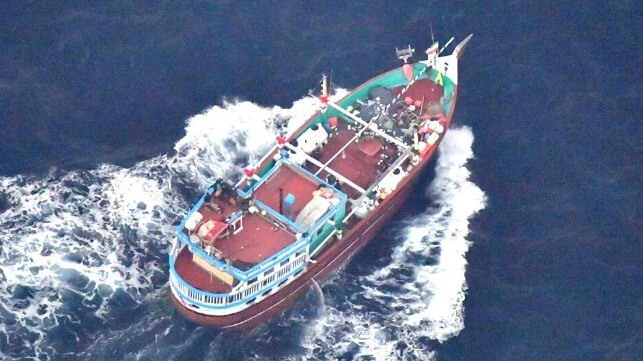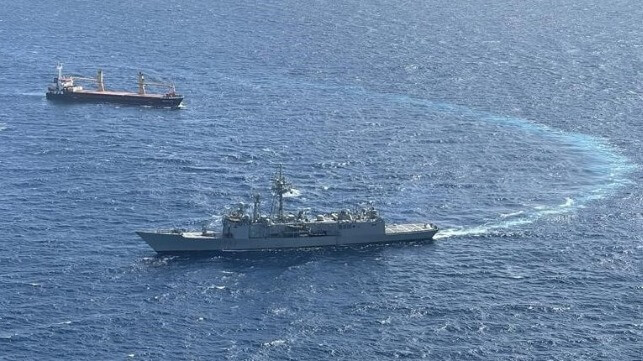Red Sea Tensions May Help Revive Somali Piracy

Maritime security analysts are concerned that the disruption in the Red Sea and Gulf of Aden may be creating new opportunities for Somali pirates, who had been quasi-dormant since 2012 but have recently picked up the pace.
EUNAVFOR assesses that there are at least two pirate action groups now operating in the Eastern Indian Ocean, and they may be equipped with mother ships (hijacked dhows) to increase their range. This aligns with a substantial uptick in pirate activity: Neptune P2P, a piracy consultancy, counts 16 incidents (of varying severity) since late November.
The first sign of trouble came on Nov. 22, when Somali pirates hijacked the Iranian fishing vessel Al Miraj 1 off the coast of Puntland. Neptune's local sources reported that the vessel had been stolen by a local gang for duty as a pirate mothership. This working method was used often during the peak years of Somali piracy.
On January 4, suspected Somali pirates boarded and attempted to hijack the bulker Lila Norfolk off Eyl, Somalia. The attack was unsuccessful and the assailants fled.
Multiple smaller fishing vessels have been hijacked over the course of the month (seven more, by Neptune's count); at least three have been rescued by the Indian Navy.
At the same time that pirate action groups have been gearing up again, the foreign naval forces that have protected shipping against Somali piracy have had a portion of their capacity diverted to deal with Yemen's Houthi rebels, who have repeatedly attacked shipping in the Red Sea and Gulf of Aden. It is likely that Somali criminals see a window of opportunity for piracy now that the Houthis are creating a distraction, according to Neptune.
At the same time, the Houthis' attacks have made the Red Sea less attractive, and have forced hundreds more ships to take the route around the Cape of Good Hope. Depending on the point of departure, the route around the Cape can include a transit through waters nearer to Somalia. "This presents a significant increase in the number of ‘targets’ for pirates to exploit, especially vessels transiting to and from the Persian Gulf," assessed Neptune P2P.
Dr. Ian Ralby, of maritime security consultancy IR Consilium, agrees that the ship diversions also come with a risk of exposure to Somali piracy - and that the pirate action groups have been keeping ready.
"[Somali] skills for piracy were not lost over the last decade, they were transferred. A lot of the attacks by Somali pirates were against vessels that were engaged in illicit trafficking. The reporting just hasn't been there," he said in testimony in Congress this week.
EU Moves to Launch Red Sea Defense Mission in February

European Union defense ministers were meeting in Belgium on Wednesday to finalize plans for a defensive mission in the Red Sea which they hope to authorize by mid-February with Belgium and Germany saying that they would likely provide warships. The move comes as the U.S. failed to build the broader coalition and after last week’s successful attack by the Houthi which caused a fire on a British-managed product tanker.
Ministers from the EU, Germany, and Belgium each spoke with reporters at the start of the meeting providing insights into the plan. They said the purpose of the meeting was to define the mission and agree to details including which country would lead the effort, the base of the operations, and other operational details. AP reports that France, Greece, and Italy are each proposing to take the lead with a total of seven countries expected to participate in a new operation to be called Aspides (meaning protector).
The EU’s Representative for Foreign Affairs, Josep Borrell Fontelles of Spain, spoke with reporters announcing the mission saying it would be purely defensive and was in response to requests from “many European firms” that said the attacks were increasing costs and endangering business and trade. Borrell said the EU would only be intercepting and blocking attacks against commercial shipping. The operations he said would only be on sea, inferring that the EU would not follow the U.S. and UK in striking Houthi targets in Yemen.
Critics have said the EU was slow to respond to the Houthi attacks and security threat to shipping with reported internal divisions. Borrell indirectly addresses these issues saying that none of the member states would move to block the effort, but that not all member states would be participating.
The U.S. effort failed to win participation from the Europeans in part it is believed over disputes about the approach and an unwillingness from some member states to have the U.S. in the lead. It is believed members did not want to participate in the land strikes. Germany had delayed sending a vessel while France reportedly withdrew from the U.S.-led mission and has its warships operating independently in the Red Sea providing protection to CMA CGM vessels and others. A French warship responded to Friday’s attack on the product tanker Marlin Luanda.
Borrell said the goal was to have the plan adopted by February 17 and that they would work off the existing EU efforts in the region and in coordination with the U.S. The EUNAVFOR has a standing operation Atalanta focused on Somalia and piracy. France and Italy have vessels in the area as part of the EUNAVFOR operations. Denmark earlier this week dispatched a frigate to the Mediterranean in advance of an authorizing vote by its parliament.
Germany’s defense minister Siemtje Moller told reporters the goal was to have the plan approved by the Bundestag after a February 19 approval by the EU Council. She said Germany’s navy was preparing for possible participation. At the same time, Belgian Defense Minister Ludivine Debonder announced their frigate Louise-Marie, already in the Red Sea region, would likely be part of the mission.
The EU may be responding to pressure from the energy industry which is joining the container carriers in diverting vessels. Bloomberg is citing a report today from Oil Brokerage showing a 45 percent increase in tanker diversions since last week’s attack. They report that the number of vessels being sent around Africa rose from 69 to 100. Reuters is reporting that even carriers with Russian oil products have begun to avoid the Red Sea due to the increased dangers.
No comments:
Post a Comment